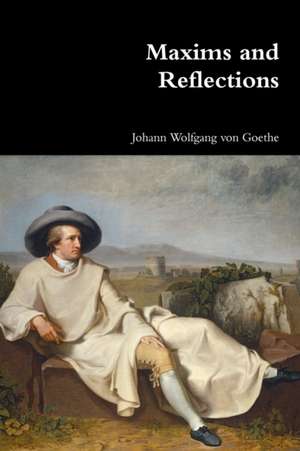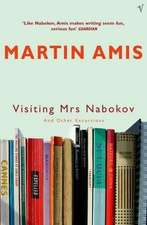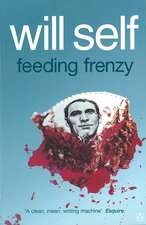Maxims and Reflections
Autor Johann Wolfgang von Goetheen Limba Engleză Paperback – 9 mai 2017
Although employed as a Privy Councillor at the Duke of Weimar’s court, where he helped oversee major mining, road-building and irrigation projects, he also painted, directed plays, carried out research in anatomy, botany and optics – and still found time to produce masterpieces in every literary genre. His fourteen hundredMaxims and Reflectionsreveal some of his deepest thought on art, ethics, literature and natural science, but also his immediate reactions to books, chance encounters or his administrative work. Although variable in quality, the vast majority have a freshness and immediacy which vividly conjure up Goethe the man. They make an ideal introduction to one of the greatest of European writers.
| Toate formatele și edițiile | Preț | Express |
|---|---|---|
| Paperback (4) | 55.84 lei 3-5 săpt. | |
| CREATESPACE – | 55.84 lei 3-5 săpt. | |
| Penguin Books – 26 aug 1998 | 56.81 lei 22-33 zile | +18.18 lei 7-13 zile |
| Lulu.Com – 9 mai 2017 | 57.19 lei 6-8 săpt. | |
| Indoeuropeanpublishing.com – 10 mai 2022 | 101.72 lei 6-8 săpt. | |
| Hardback (1) | 146.28 lei 6-8 săpt. | |
| Lulu.Com – 9 mai 2017 | 146.28 lei 6-8 săpt. |
Preț: 57.19 lei
Nou
10.94€ • 11.41$ • 9.10£
Carte tipărită la comandă
Livrare economică 20 martie-03 aprilie
Specificații
ISBN-10: 1365952304
Pagini: 56
Dimensiuni: 152 x 229 x 4 mm
Greutate: 0.1 kg
Editura: Lulu.Com
Notă biografică
Cuprins
Introduction
Further Reading
A Note on the Text
FROM ELECTIVE AFFINITIES (1809)
From Ottilie's Diary
FROM ART AND ANTIQUITY
Vol. I, issue 3: Naïvety and Humour (1818)
Vol. II, issue 3: Matters of Serious Moment (1820)
Vol. III, issue 1: Own and Adopted Ideas in Proverbial Formulation (1821)
Vol. IV, issue 2: Own and Assimilated Material (1823)
Vol. V, issue 1: Individual Points (1824)
Vol. V, issue 2: Individual Points (1825)
Vol. V, issue 3: Individual Points (1826)
Vol. VI, issue 1: [untitled] (1827)
FROM THE PERIODICAL ISSUES ON MORPHOLOGY
Vol. I, issue 4: [untitled] (1822)
FROM THE PERIODICAL ISSUES ON THE NATURAL SCIENCES
Vol. II, issue 1: Old Ideas, Almost out of Date (1823)
FROM WILHELM MEISTER'S JOURNEYMAN YEARS (1829)
Thoughs about Art, Ethics and Nature in the Spirit of the Travellers
From Makarie's Archive
POSTHUMOUS
On Literature and Life
On Art and Art History: Aphorisms for the Attention of Friends and Opponents
On Nature and Natural Science
Sketchy, Doubtful, Incomplete Jottings
Addenda from the Posthumous Papers
Notes














